Business Law Report: DIG plc, Directors' Duties and Shareholder Rights
VerifiedAdded on 2020/10/05
|12
|3127
|85
Report
AI Summary
This report examines a business law case involving DIG plc, a mining company, and its directors, Adam and James, alongside the majority shareholder, Alex. The core issue revolves around the directors' duties, particularly under Section 175 of the Companies Act 2006, which addresses conflicts of inte...
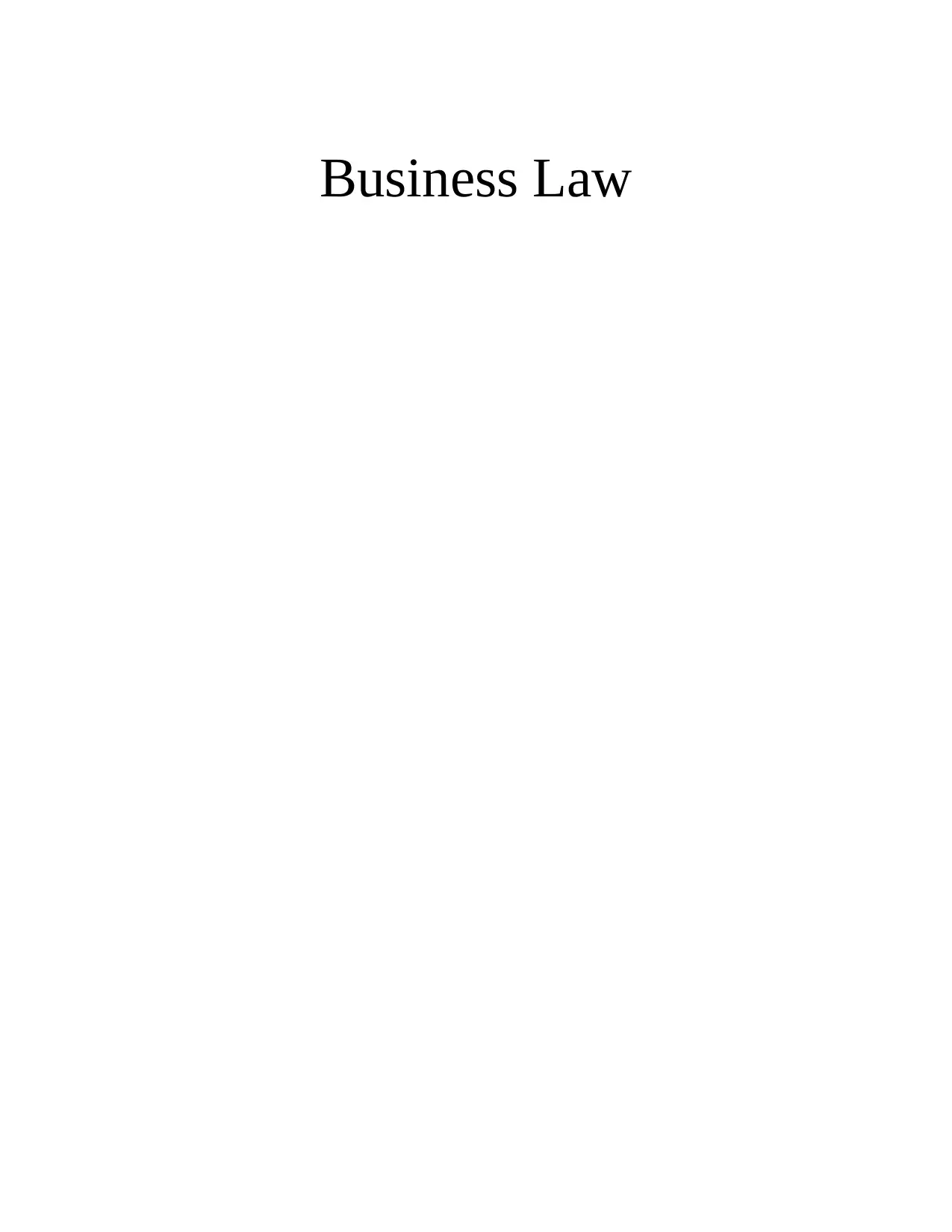
Business Law
Paraphrase This Document
Need a fresh take? Get an instant paraphrase of this document with our AI Paraphraser
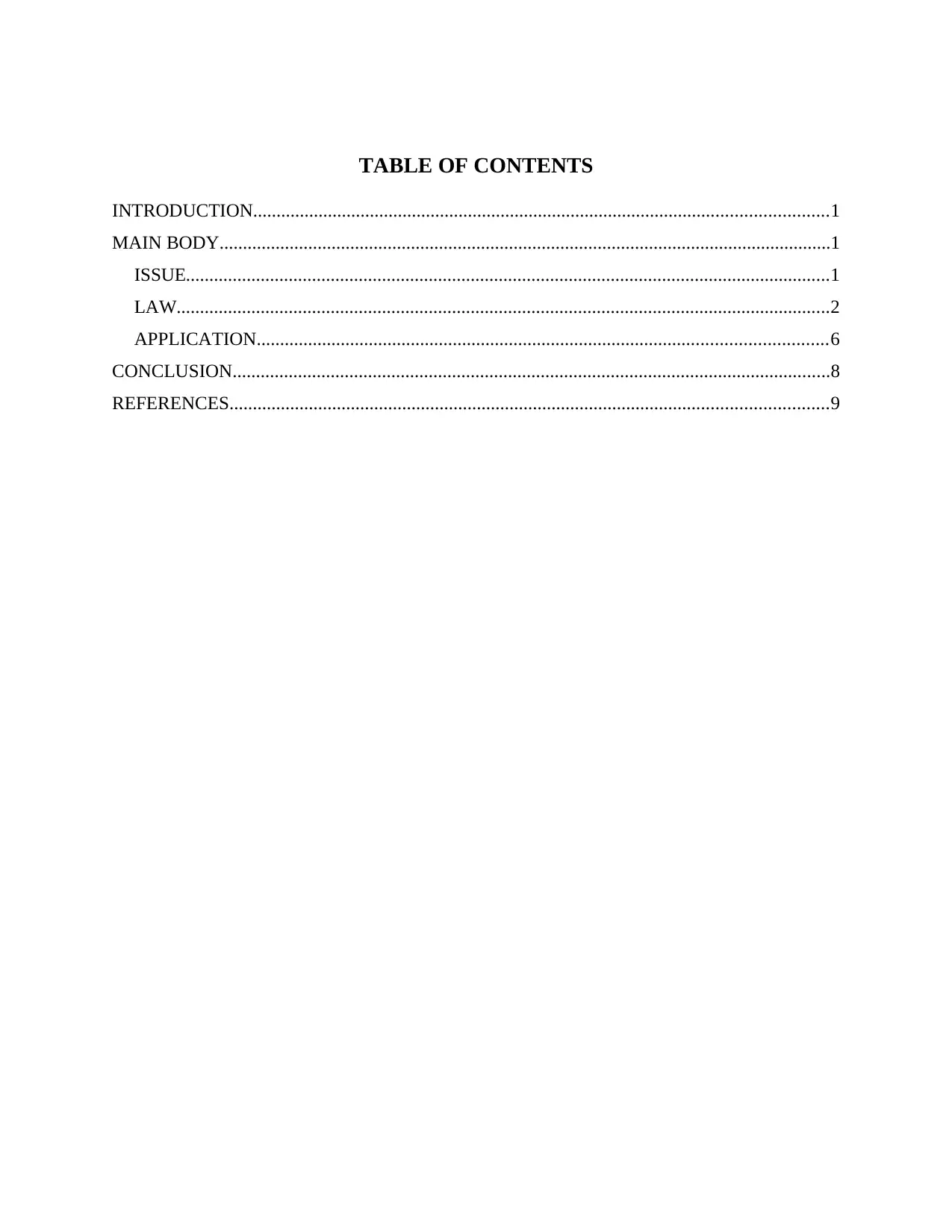
TABLE OF CONTENTS
INTRODUCTION...........................................................................................................................1
MAIN BODY...................................................................................................................................1
ISSUE..........................................................................................................................................1
LAW............................................................................................................................................2
APPLICATION..........................................................................................................................6
CONCLUSION................................................................................................................................8
REFERENCES................................................................................................................................9
INTRODUCTION...........................................................................................................................1
MAIN BODY...................................................................................................................................1
ISSUE..........................................................................................................................................1
LAW............................................................................................................................................2
APPLICATION..........................................................................................................................6
CONCLUSION................................................................................................................................8
REFERENCES................................................................................................................................9
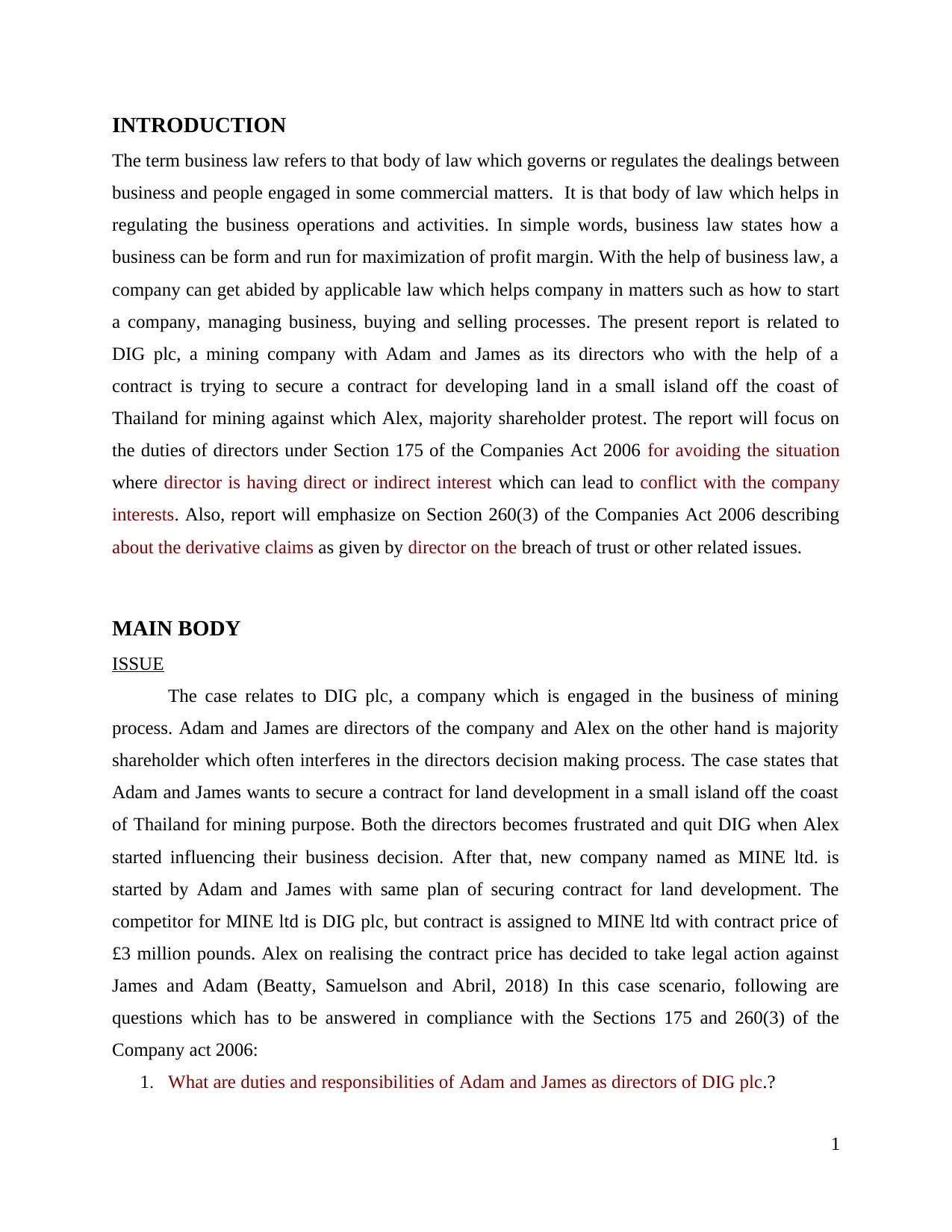
INTRODUCTION
The term business law refers to that body of law which governs or regulates the dealings between
business and people engaged in some commercial matters. It is that body of law which helps in
regulating the business operations and activities. In simple words, business law states how a
business can be form and run for maximization of profit margin. With the help of business law, a
company can get abided by applicable law which helps company in matters such as how to start
a company, managing business, buying and selling processes. The present report is related to
DIG plc, a mining company with Adam and James as its directors who with the help of a
contract is trying to secure a contract for developing land in a small island off the coast of
Thailand for mining against which Alex, majority shareholder protest. The report will focus on
the duties of directors under Section 175 of the Companies Act 2006 for avoiding the situation
where director is having direct or indirect interest which can lead to conflict with the company
interests. Also, report will emphasize on Section 260(3) of the Companies Act 2006 describing
about the derivative claims as given by director on the breach of trust or other related issues.
MAIN BODY
ISSUE
The case relates to DIG plc, a company which is engaged in the business of mining
process. Adam and James are directors of the company and Alex on the other hand is majority
shareholder which often interferes in the directors decision making process. The case states that
Adam and James wants to secure a contract for land development in a small island off the coast
of Thailand for mining purpose. Both the directors becomes frustrated and quit DIG when Alex
started influencing their business decision. After that, new company named as MINE ltd. is
started by Adam and James with same plan of securing contract for land development. The
competitor for MINE ltd is DIG plc, but contract is assigned to MINE ltd with contract price of
£3 million pounds. Alex on realising the contract price has decided to take legal action against
James and Adam (Beatty, Samuelson and Abril, 2018) In this case scenario, following are
questions which has to be answered in compliance with the Sections 175 and 260(3) of the
Company act 2006:
1. What are duties and responsibilities of Adam and James as directors of DIG plc.?
1
The term business law refers to that body of law which governs or regulates the dealings between
business and people engaged in some commercial matters. It is that body of law which helps in
regulating the business operations and activities. In simple words, business law states how a
business can be form and run for maximization of profit margin. With the help of business law, a
company can get abided by applicable law which helps company in matters such as how to start
a company, managing business, buying and selling processes. The present report is related to
DIG plc, a mining company with Adam and James as its directors who with the help of a
contract is trying to secure a contract for developing land in a small island off the coast of
Thailand for mining against which Alex, majority shareholder protest. The report will focus on
the duties of directors under Section 175 of the Companies Act 2006 for avoiding the situation
where director is having direct or indirect interest which can lead to conflict with the company
interests. Also, report will emphasize on Section 260(3) of the Companies Act 2006 describing
about the derivative claims as given by director on the breach of trust or other related issues.
MAIN BODY
ISSUE
The case relates to DIG plc, a company which is engaged in the business of mining
process. Adam and James are directors of the company and Alex on the other hand is majority
shareholder which often interferes in the directors decision making process. The case states that
Adam and James wants to secure a contract for land development in a small island off the coast
of Thailand for mining purpose. Both the directors becomes frustrated and quit DIG when Alex
started influencing their business decision. After that, new company named as MINE ltd. is
started by Adam and James with same plan of securing contract for land development. The
competitor for MINE ltd is DIG plc, but contract is assigned to MINE ltd with contract price of
£3 million pounds. Alex on realising the contract price has decided to take legal action against
James and Adam (Beatty, Samuelson and Abril, 2018) In this case scenario, following are
questions which has to be answered in compliance with the Sections 175 and 260(3) of the
Company act 2006:
1. What are duties and responsibilities of Adam and James as directors of DIG plc.?
1
⊘ This is a preview!⊘
Do you want full access?
Subscribe today to unlock all pages.

Trusted by 1+ million students worldwide
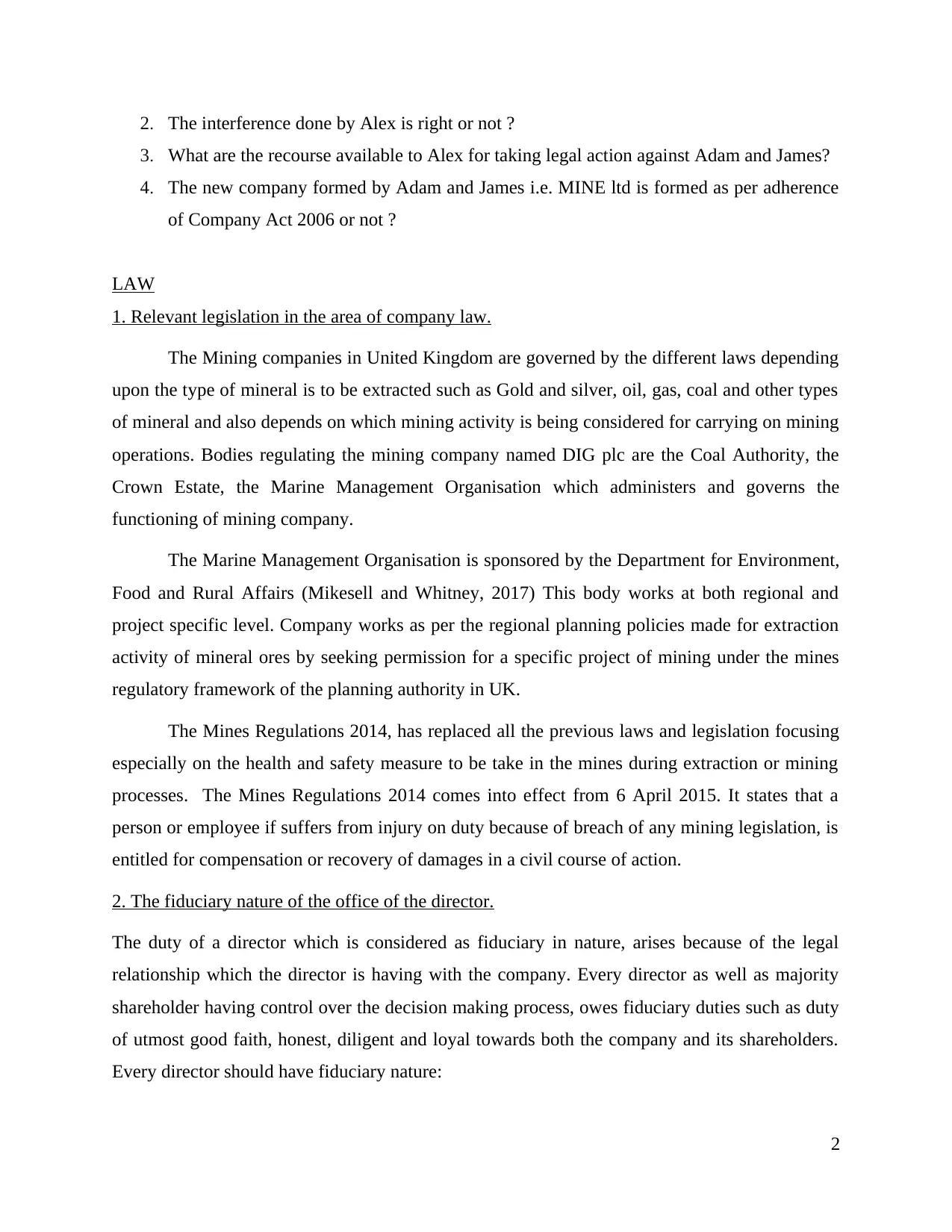
2. The interference done by Alex is right or not ?
3. What are the recourse available to Alex for taking legal action against Adam and James?
4. The new company formed by Adam and James i.e. MINE ltd is formed as per adherence
of Company Act 2006 or not ?
LAW
1. Relevant legislation in the area of company law.
The Mining companies in United Kingdom are governed by the different laws depending
upon the type of mineral is to be extracted such as Gold and silver, oil, gas, coal and other types
of mineral and also depends on which mining activity is being considered for carrying on mining
operations. Bodies regulating the mining company named DIG plc are the Coal Authority, the
Crown Estate, the Marine Management Organisation which administers and governs the
functioning of mining company.
The Marine Management Organisation is sponsored by the Department for Environment,
Food and Rural Affairs (Mikesell and Whitney, 2017) This body works at both regional and
project specific level. Company works as per the regional planning policies made for extraction
activity of mineral ores by seeking permission for a specific project of mining under the mines
regulatory framework of the planning authority in UK.
The Mines Regulations 2014, has replaced all the previous laws and legislation focusing
especially on the health and safety measure to be take in the mines during extraction or mining
processes. The Mines Regulations 2014 comes into effect from 6 April 2015. It states that a
person or employee if suffers from injury on duty because of breach of any mining legislation, is
entitled for compensation or recovery of damages in a civil course of action.
2. The fiduciary nature of the office of the director.
The duty of a director which is considered as fiduciary in nature, arises because of the legal
relationship which the director is having with the company. Every director as well as majority
shareholder having control over the decision making process, owes fiduciary duties such as duty
of utmost good faith, honest, diligent and loyal towards both the company and its shareholders.
Every director should have fiduciary nature:
2
3. What are the recourse available to Alex for taking legal action against Adam and James?
4. The new company formed by Adam and James i.e. MINE ltd is formed as per adherence
of Company Act 2006 or not ?
LAW
1. Relevant legislation in the area of company law.
The Mining companies in United Kingdom are governed by the different laws depending
upon the type of mineral is to be extracted such as Gold and silver, oil, gas, coal and other types
of mineral and also depends on which mining activity is being considered for carrying on mining
operations. Bodies regulating the mining company named DIG plc are the Coal Authority, the
Crown Estate, the Marine Management Organisation which administers and governs the
functioning of mining company.
The Marine Management Organisation is sponsored by the Department for Environment,
Food and Rural Affairs (Mikesell and Whitney, 2017) This body works at both regional and
project specific level. Company works as per the regional planning policies made for extraction
activity of mineral ores by seeking permission for a specific project of mining under the mines
regulatory framework of the planning authority in UK.
The Mines Regulations 2014, has replaced all the previous laws and legislation focusing
especially on the health and safety measure to be take in the mines during extraction or mining
processes. The Mines Regulations 2014 comes into effect from 6 April 2015. It states that a
person or employee if suffers from injury on duty because of breach of any mining legislation, is
entitled for compensation or recovery of damages in a civil course of action.
2. The fiduciary nature of the office of the director.
The duty of a director which is considered as fiduciary in nature, arises because of the legal
relationship which the director is having with the company. Every director as well as majority
shareholder having control over the decision making process, owes fiduciary duties such as duty
of utmost good faith, honest, diligent and loyal towards both the company and its shareholders.
Every director should have fiduciary nature:
2
Paraphrase This Document
Need a fresh take? Get an instant paraphrase of this document with our AI Paraphraser
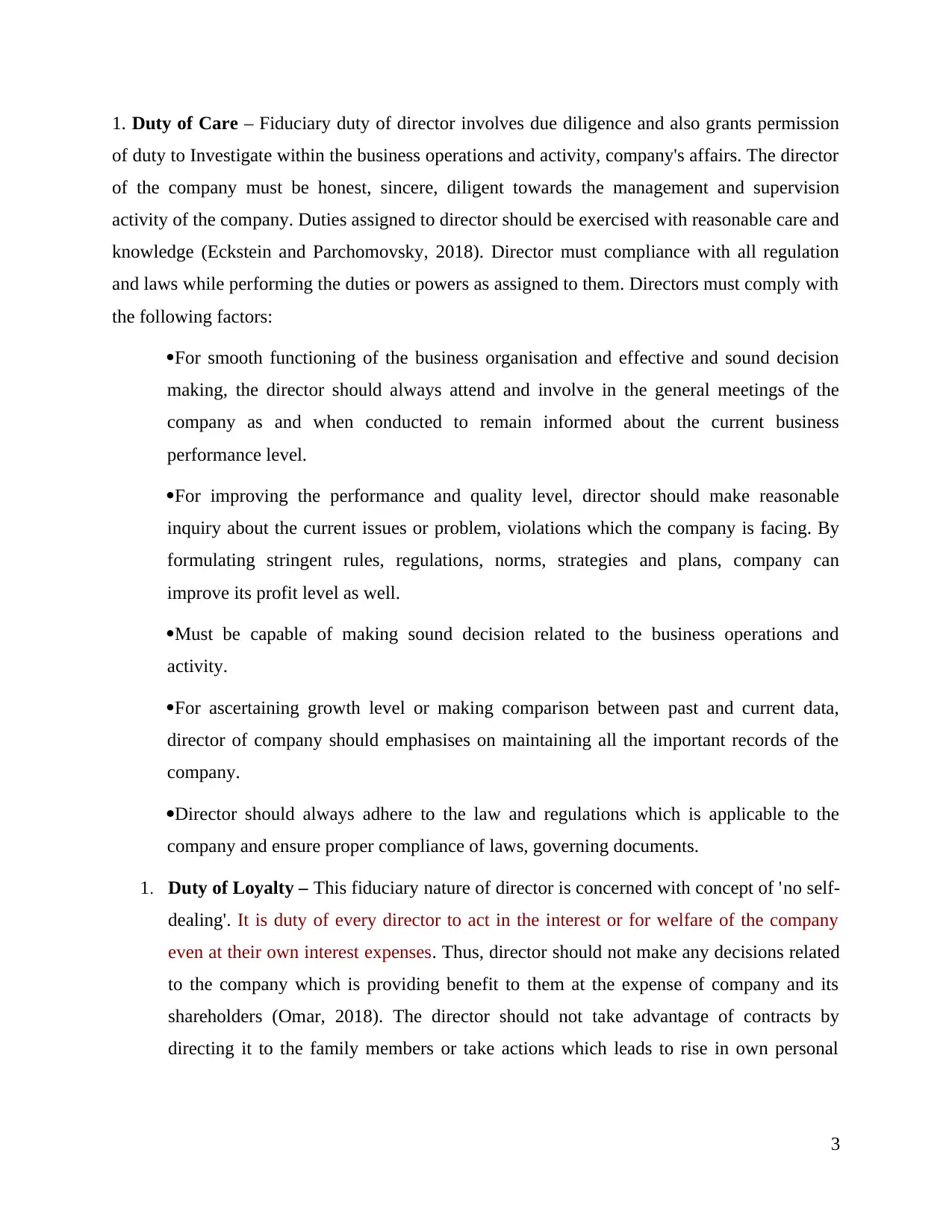
1. Duty of Care – Fiduciary duty of director involves due diligence and also grants permission
of duty to Investigate within the business operations and activity, company's affairs. The director
of the company must be honest, sincere, diligent towards the management and supervision
activity of the company. Duties assigned to director should be exercised with reasonable care and
knowledge (Eckstein and Parchomovsky, 2018). Director must compliance with all regulation
and laws while performing the duties or powers as assigned to them. Directors must comply with
the following factors:
For smooth functioning of the business organisation and effective and sound decision
making, the director should always attend and involve in the general meetings of the
company as and when conducted to remain informed about the current business
performance level.
For improving the performance and quality level, director should make reasonable
inquiry about the current issues or problem, violations which the company is facing. By
formulating stringent rules, regulations, norms, strategies and plans, company can
improve its profit level as well.
Must be capable of making sound decision related to the business operations and
activity.
For ascertaining growth level or making comparison between past and current data,
director of company should emphasises on maintaining all the important records of the
company.
Director should always adhere to the law and regulations which is applicable to the
company and ensure proper compliance of laws, governing documents.
1. Duty of Loyalty – This fiduciary nature of director is concerned with concept of 'no self-
dealing'. It is duty of every director to act in the interest or for welfare of the company
even at their own interest expenses. Thus, director should not make any decisions related
to the company which is providing benefit to them at the expense of company and its
shareholders (Omar, 2018). The director should not take advantage of contracts by
directing it to the family members or take actions which leads to rise in own personal
3
of duty to Investigate within the business operations and activity, company's affairs. The director
of the company must be honest, sincere, diligent towards the management and supervision
activity of the company. Duties assigned to director should be exercised with reasonable care and
knowledge (Eckstein and Parchomovsky, 2018). Director must compliance with all regulation
and laws while performing the duties or powers as assigned to them. Directors must comply with
the following factors:
For smooth functioning of the business organisation and effective and sound decision
making, the director should always attend and involve in the general meetings of the
company as and when conducted to remain informed about the current business
performance level.
For improving the performance and quality level, director should make reasonable
inquiry about the current issues or problem, violations which the company is facing. By
formulating stringent rules, regulations, norms, strategies and plans, company can
improve its profit level as well.
Must be capable of making sound decision related to the business operations and
activity.
For ascertaining growth level or making comparison between past and current data,
director of company should emphasises on maintaining all the important records of the
company.
Director should always adhere to the law and regulations which is applicable to the
company and ensure proper compliance of laws, governing documents.
1. Duty of Loyalty – This fiduciary nature of director is concerned with concept of 'no self-
dealing'. It is duty of every director to act in the interest or for welfare of the company
even at their own interest expenses. Thus, director should not make any decisions related
to the company which is providing benefit to them at the expense of company and its
shareholders (Omar, 2018). The director should not take advantage of contracts by
directing it to the family members or take actions which leads to rise in own personal
3
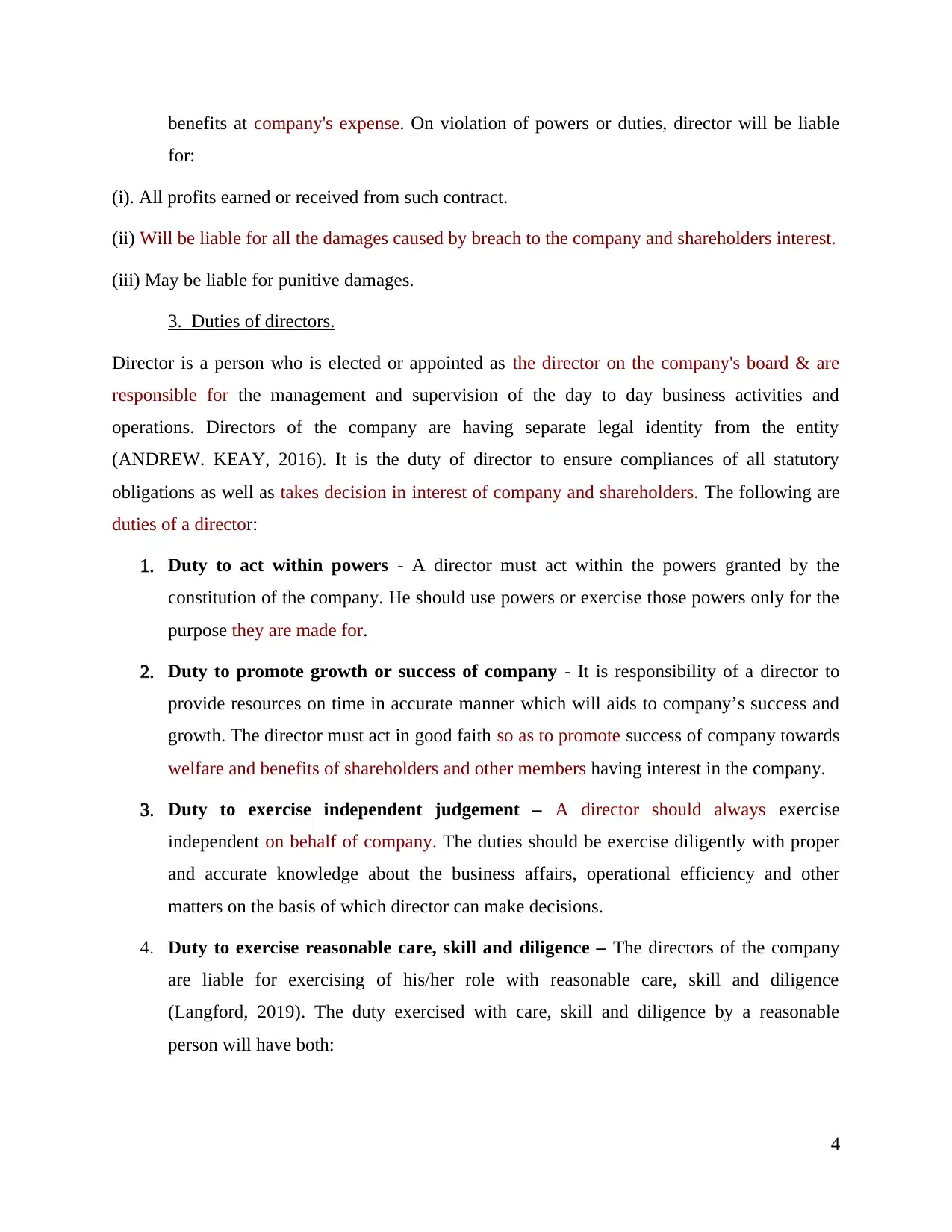
benefits at company's expense. On violation of powers or duties, director will be liable
for:
(i). All profits earned or received from such contract.
(ii) Will be liable for all the damages caused by breach to the company and shareholders interest.
(iii) May be liable for punitive damages.
3. Duties of directors.
Director is a person who is elected or appointed as the director on the company's board & are
responsible for the management and supervision of the day to day business activities and
operations. Directors of the company are having separate legal identity from the entity
(ANDREW. KEAY, 2016). It is the duty of director to ensure compliances of all statutory
obligations as well as takes decision in interest of company and shareholders. The following are
duties of a director:
1. Duty to act within powers - A director must act within the powers granted by the
constitution of the company. He should use powers or exercise those powers only for the
purpose they are made for.
2. Duty to promote growth or success of company - It is responsibility of a director to
provide resources on time in accurate manner which will aids to company’s success and
growth. The director must act in good faith so as to promote success of company towards
welfare and benefits of shareholders and other members having interest in the company.
3. Duty to exercise independent judgement – A director should always exercise
independent on behalf of company. The duties should be exercise diligently with proper
and accurate knowledge about the business affairs, operational efficiency and other
matters on the basis of which director can make decisions.
4. Duty to exercise reasonable care, skill and diligence – The directors of the company
are liable for exercising of his/her role with reasonable care, skill and diligence
(Langford, 2019). The duty exercised with care, skill and diligence by a reasonable
person will have both:
4
for:
(i). All profits earned or received from such contract.
(ii) Will be liable for all the damages caused by breach to the company and shareholders interest.
(iii) May be liable for punitive damages.
3. Duties of directors.
Director is a person who is elected or appointed as the director on the company's board & are
responsible for the management and supervision of the day to day business activities and
operations. Directors of the company are having separate legal identity from the entity
(ANDREW. KEAY, 2016). It is the duty of director to ensure compliances of all statutory
obligations as well as takes decision in interest of company and shareholders. The following are
duties of a director:
1. Duty to act within powers - A director must act within the powers granted by the
constitution of the company. He should use powers or exercise those powers only for the
purpose they are made for.
2. Duty to promote growth or success of company - It is responsibility of a director to
provide resources on time in accurate manner which will aids to company’s success and
growth. The director must act in good faith so as to promote success of company towards
welfare and benefits of shareholders and other members having interest in the company.
3. Duty to exercise independent judgement – A director should always exercise
independent on behalf of company. The duties should be exercise diligently with proper
and accurate knowledge about the business affairs, operational efficiency and other
matters on the basis of which director can make decisions.
4. Duty to exercise reasonable care, skill and diligence – The directors of the company
are liable for exercising of his/her role with reasonable care, skill and diligence
(Langford, 2019). The duty exercised with care, skill and diligence by a reasonable
person will have both:
4
⊘ This is a preview!⊘
Do you want full access?
Subscribe today to unlock all pages.

Trusted by 1+ million students worldwide
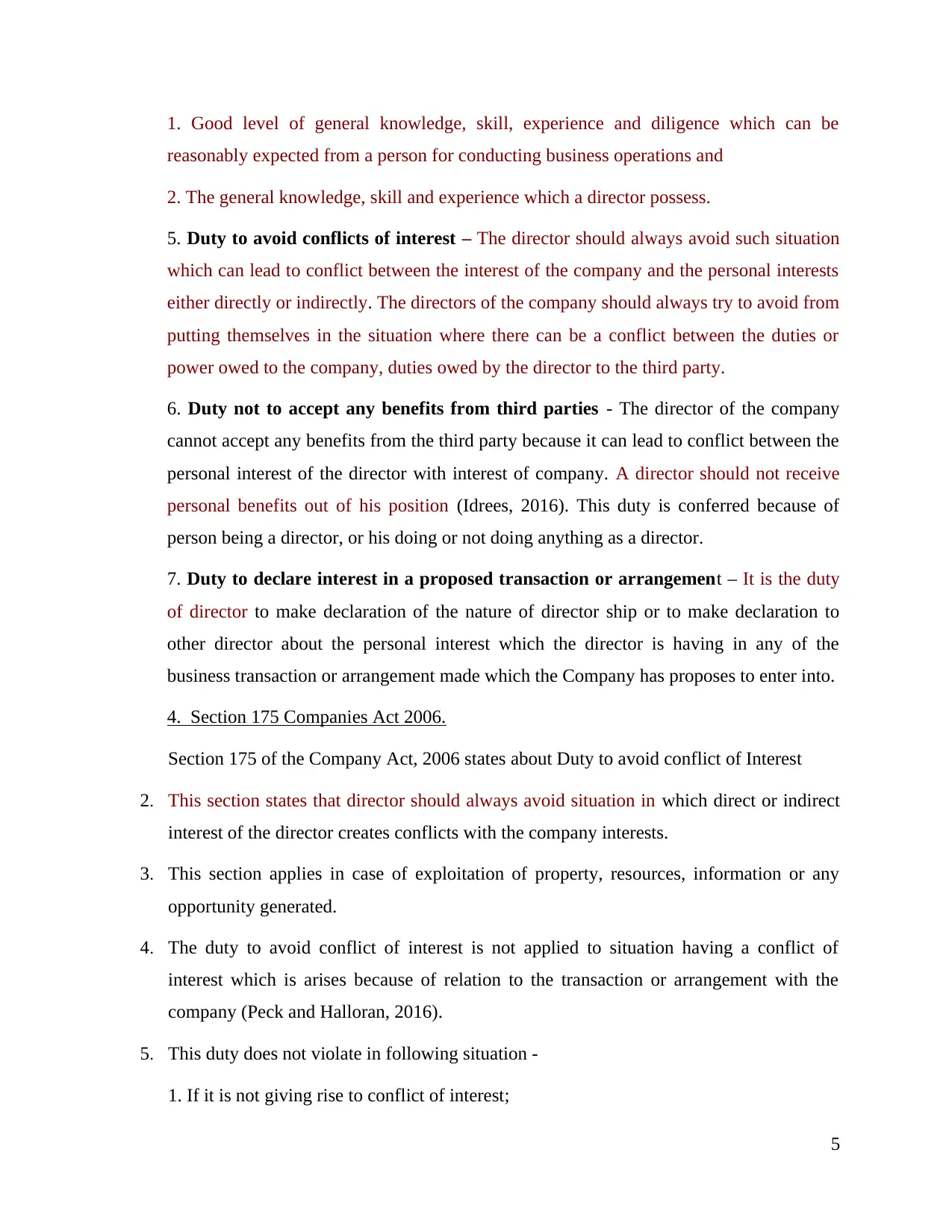
1. Good level of general knowledge, skill, experience and diligence which can be
reasonably expected from a person for conducting business operations and
2. The general knowledge, skill and experience which a director possess.
5. Duty to avoid conflicts of interest – The director should always avoid such situation
which can lead to conflict between the interest of the company and the personal interests
either directly or indirectly. The directors of the company should always try to avoid from
putting themselves in the situation where there can be a conflict between the duties or
power owed to the company, duties owed by the director to the third party.
6. Duty not to accept any benefits from third parties - The director of the company
cannot accept any benefits from the third party because it can lead to conflict between the
personal interest of the director with interest of company. A director should not receive
personal benefits out of his position (Idrees, 2016). This duty is conferred because of
person being a director, or his doing or not doing anything as a director.
7. Duty to declare interest in a proposed transaction or arrangement – It is the duty
of director to make declaration of the nature of director ship or to make declaration to
other director about the personal interest which the director is having in any of the
business transaction or arrangement made which the Company has proposes to enter into.
4. Section 175 Companies Act 2006.
Section 175 of the Company Act, 2006 states about Duty to avoid conflict of Interest
2. This section states that director should always avoid situation in which direct or indirect
interest of the director creates conflicts with the company interests.
3. This section applies in case of exploitation of property, resources, information or any
opportunity generated.
4. The duty to avoid conflict of interest is not applied to situation having a conflict of
interest which is arises because of relation to the transaction or arrangement with the
company (Peck and Halloran, 2016).
5. This duty does not violate in following situation -
1. If it is not giving rise to conflict of interest;
5
reasonably expected from a person for conducting business operations and
2. The general knowledge, skill and experience which a director possess.
5. Duty to avoid conflicts of interest – The director should always avoid such situation
which can lead to conflict between the interest of the company and the personal interests
either directly or indirectly. The directors of the company should always try to avoid from
putting themselves in the situation where there can be a conflict between the duties or
power owed to the company, duties owed by the director to the third party.
6. Duty not to accept any benefits from third parties - The director of the company
cannot accept any benefits from the third party because it can lead to conflict between the
personal interest of the director with interest of company. A director should not receive
personal benefits out of his position (Idrees, 2016). This duty is conferred because of
person being a director, or his doing or not doing anything as a director.
7. Duty to declare interest in a proposed transaction or arrangement – It is the duty
of director to make declaration of the nature of director ship or to make declaration to
other director about the personal interest which the director is having in any of the
business transaction or arrangement made which the Company has proposes to enter into.
4. Section 175 Companies Act 2006.
Section 175 of the Company Act, 2006 states about Duty to avoid conflict of Interest
2. This section states that director should always avoid situation in which direct or indirect
interest of the director creates conflicts with the company interests.
3. This section applies in case of exploitation of property, resources, information or any
opportunity generated.
4. The duty to avoid conflict of interest is not applied to situation having a conflict of
interest which is arises because of relation to the transaction or arrangement with the
company (Peck and Halloran, 2016).
5. This duty does not violate in following situation -
1. If it is not giving rise to conflict of interest;
5
Paraphrase This Document
Need a fresh take? Get an instant paraphrase of this document with our AI Paraphraser
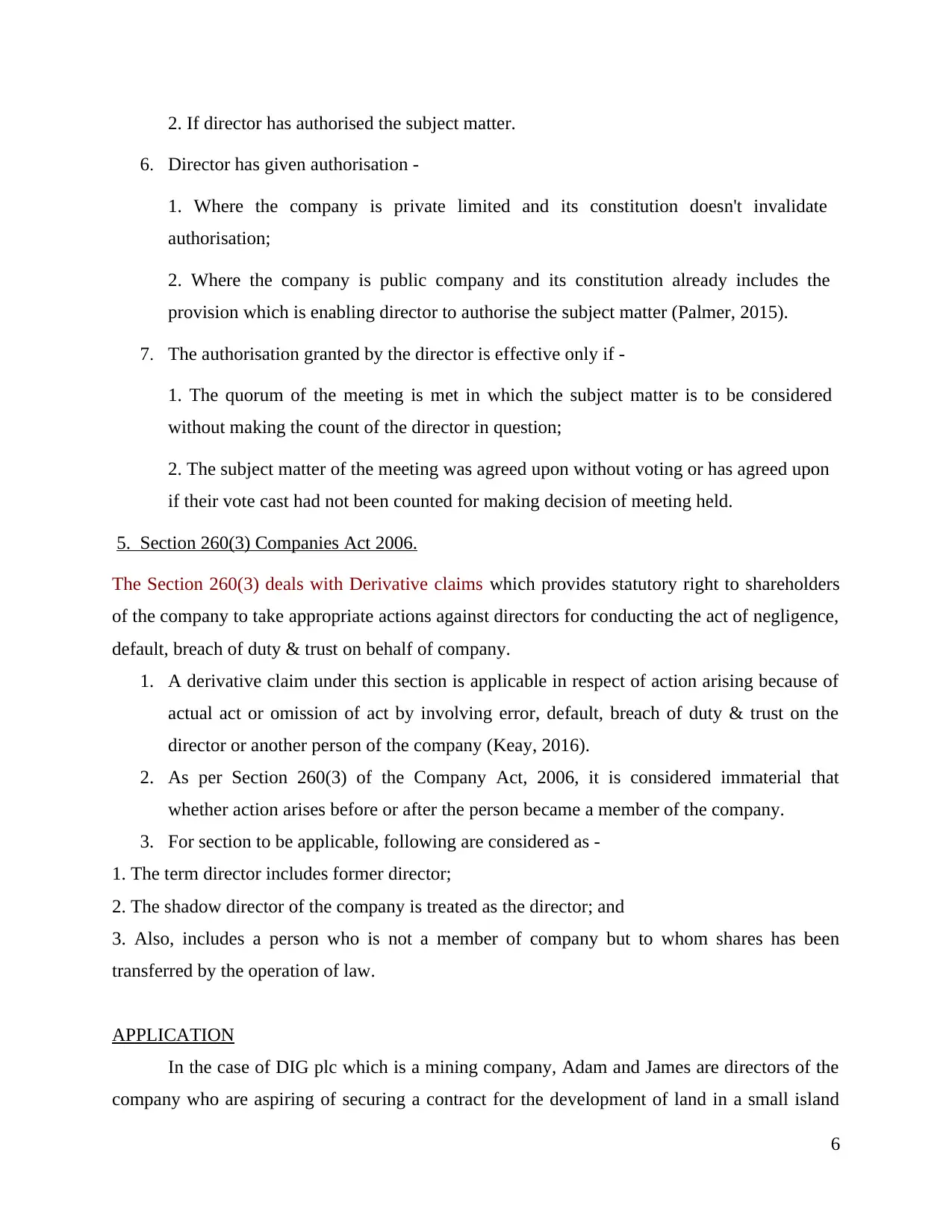
2. If director has authorised the subject matter.
6. Director has given authorisation -
1. Where the company is private limited and its constitution doesn't invalidate
authorisation;
2. Where the company is public company and its constitution already includes the
provision which is enabling director to authorise the subject matter (Palmer, 2015).
7. The authorisation granted by the director is effective only if -
1. The quorum of the meeting is met in which the subject matter is to be considered
without making the count of the director in question;
2. The subject matter of the meeting was agreed upon without voting or has agreed upon
if their vote cast had not been counted for making decision of meeting held.
5. Section 260(3) Companies Act 2006.
The Section 260(3) deals with Derivative claims which provides statutory right to shareholders
of the company to take appropriate actions against directors for conducting the act of negligence,
default, breach of duty & trust on behalf of company.
1. A derivative claim under this section is applicable in respect of action arising because of
actual act or omission of act by involving error, default, breach of duty & trust on the
director or another person of the company (Keay, 2016).
2. As per Section 260(3) of the Company Act, 2006, it is considered immaterial that
whether action arises before or after the person became a member of the company.
3. For section to be applicable, following are considered as -
1. The term director includes former director;
2. The shadow director of the company is treated as the director; and
3. Also, includes a person who is not a member of company but to whom shares has been
transferred by the operation of law.
APPLICATION
In the case of DIG plc which is a mining company, Adam and James are directors of the
company who are aspiring of securing a contract for the development of land in a small island
6
6. Director has given authorisation -
1. Where the company is private limited and its constitution doesn't invalidate
authorisation;
2. Where the company is public company and its constitution already includes the
provision which is enabling director to authorise the subject matter (Palmer, 2015).
7. The authorisation granted by the director is effective only if -
1. The quorum of the meeting is met in which the subject matter is to be considered
without making the count of the director in question;
2. The subject matter of the meeting was agreed upon without voting or has agreed upon
if their vote cast had not been counted for making decision of meeting held.
5. Section 260(3) Companies Act 2006.
The Section 260(3) deals with Derivative claims which provides statutory right to shareholders
of the company to take appropriate actions against directors for conducting the act of negligence,
default, breach of duty & trust on behalf of company.
1. A derivative claim under this section is applicable in respect of action arising because of
actual act or omission of act by involving error, default, breach of duty & trust on the
director or another person of the company (Keay, 2016).
2. As per Section 260(3) of the Company Act, 2006, it is considered immaterial that
whether action arises before or after the person became a member of the company.
3. For section to be applicable, following are considered as -
1. The term director includes former director;
2. The shadow director of the company is treated as the director; and
3. Also, includes a person who is not a member of company but to whom shares has been
transferred by the operation of law.
APPLICATION
In the case of DIG plc which is a mining company, Adam and James are directors of the
company who are aspiring of securing a contract for the development of land in a small island
6
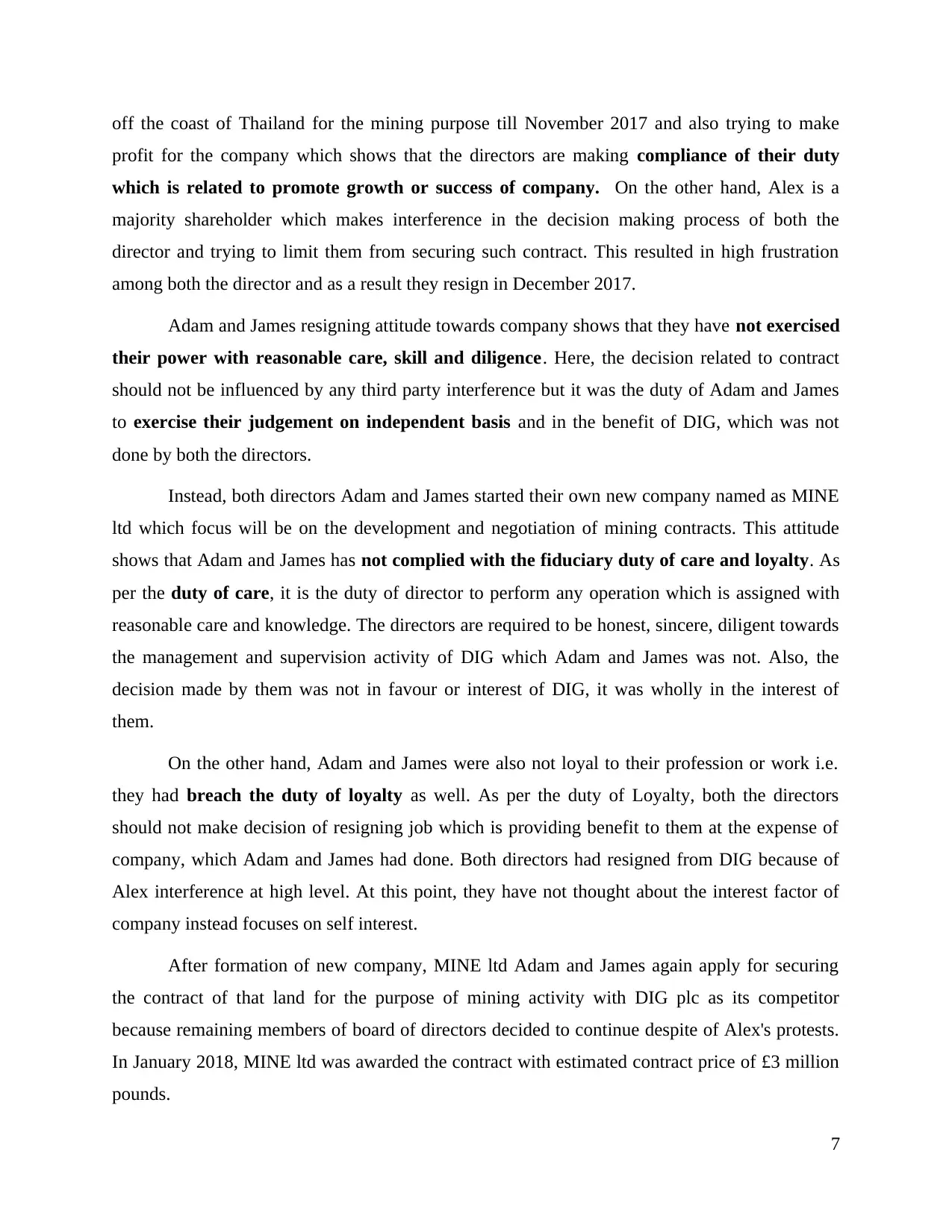
off the coast of Thailand for the mining purpose till November 2017 and also trying to make
profit for the company which shows that the directors are making compliance of their duty
which is related to promote growth or success of company. On the other hand, Alex is a
majority shareholder which makes interference in the decision making process of both the
director and trying to limit them from securing such contract. This resulted in high frustration
among both the director and as a result they resign in December 2017.
Adam and James resigning attitude towards company shows that they have not exercised
their power with reasonable care, skill and diligence. Here, the decision related to contract
should not be influenced by any third party interference but it was the duty of Adam and James
to exercise their judgement on independent basis and in the benefit of DIG, which was not
done by both the directors.
Instead, both directors Adam and James started their own new company named as MINE
ltd which focus will be on the development and negotiation of mining contracts. This attitude
shows that Adam and James has not complied with the fiduciary duty of care and loyalty. As
per the duty of care, it is the duty of director to perform any operation which is assigned with
reasonable care and knowledge. The directors are required to be honest, sincere, diligent towards
the management and supervision activity of DIG which Adam and James was not. Also, the
decision made by them was not in favour or interest of DIG, it was wholly in the interest of
them.
On the other hand, Adam and James were also not loyal to their profession or work i.e.
they had breach the duty of loyalty as well. As per the duty of Loyalty, both the directors
should not make decision of resigning job which is providing benefit to them at the expense of
company, which Adam and James had done. Both directors had resigned from DIG because of
Alex interference at high level. At this point, they have not thought about the interest factor of
company instead focuses on self interest.
After formation of new company, MINE ltd Adam and James again apply for securing
the contract of that land for the purpose of mining activity with DIG plc as its competitor
because remaining members of board of directors decided to continue despite of Alex's protests.
In January 2018, MINE ltd was awarded the contract with estimated contract price of £3 million
pounds.
7
profit for the company which shows that the directors are making compliance of their duty
which is related to promote growth or success of company. On the other hand, Alex is a
majority shareholder which makes interference in the decision making process of both the
director and trying to limit them from securing such contract. This resulted in high frustration
among both the director and as a result they resign in December 2017.
Adam and James resigning attitude towards company shows that they have not exercised
their power with reasonable care, skill and diligence. Here, the decision related to contract
should not be influenced by any third party interference but it was the duty of Adam and James
to exercise their judgement on independent basis and in the benefit of DIG, which was not
done by both the directors.
Instead, both directors Adam and James started their own new company named as MINE
ltd which focus will be on the development and negotiation of mining contracts. This attitude
shows that Adam and James has not complied with the fiduciary duty of care and loyalty. As
per the duty of care, it is the duty of director to perform any operation which is assigned with
reasonable care and knowledge. The directors are required to be honest, sincere, diligent towards
the management and supervision activity of DIG which Adam and James was not. Also, the
decision made by them was not in favour or interest of DIG, it was wholly in the interest of
them.
On the other hand, Adam and James were also not loyal to their profession or work i.e.
they had breach the duty of loyalty as well. As per the duty of Loyalty, both the directors
should not make decision of resigning job which is providing benefit to them at the expense of
company, which Adam and James had done. Both directors had resigned from DIG because of
Alex interference at high level. At this point, they have not thought about the interest factor of
company instead focuses on self interest.
After formation of new company, MINE ltd Adam and James again apply for securing
the contract of that land for the purpose of mining activity with DIG plc as its competitor
because remaining members of board of directors decided to continue despite of Alex's protests.
In January 2018, MINE ltd was awarded the contract with estimated contract price of £3 million
pounds.
7
⊘ This is a preview!⊘
Do you want full access?
Subscribe today to unlock all pages.

Trusted by 1+ million students worldwide
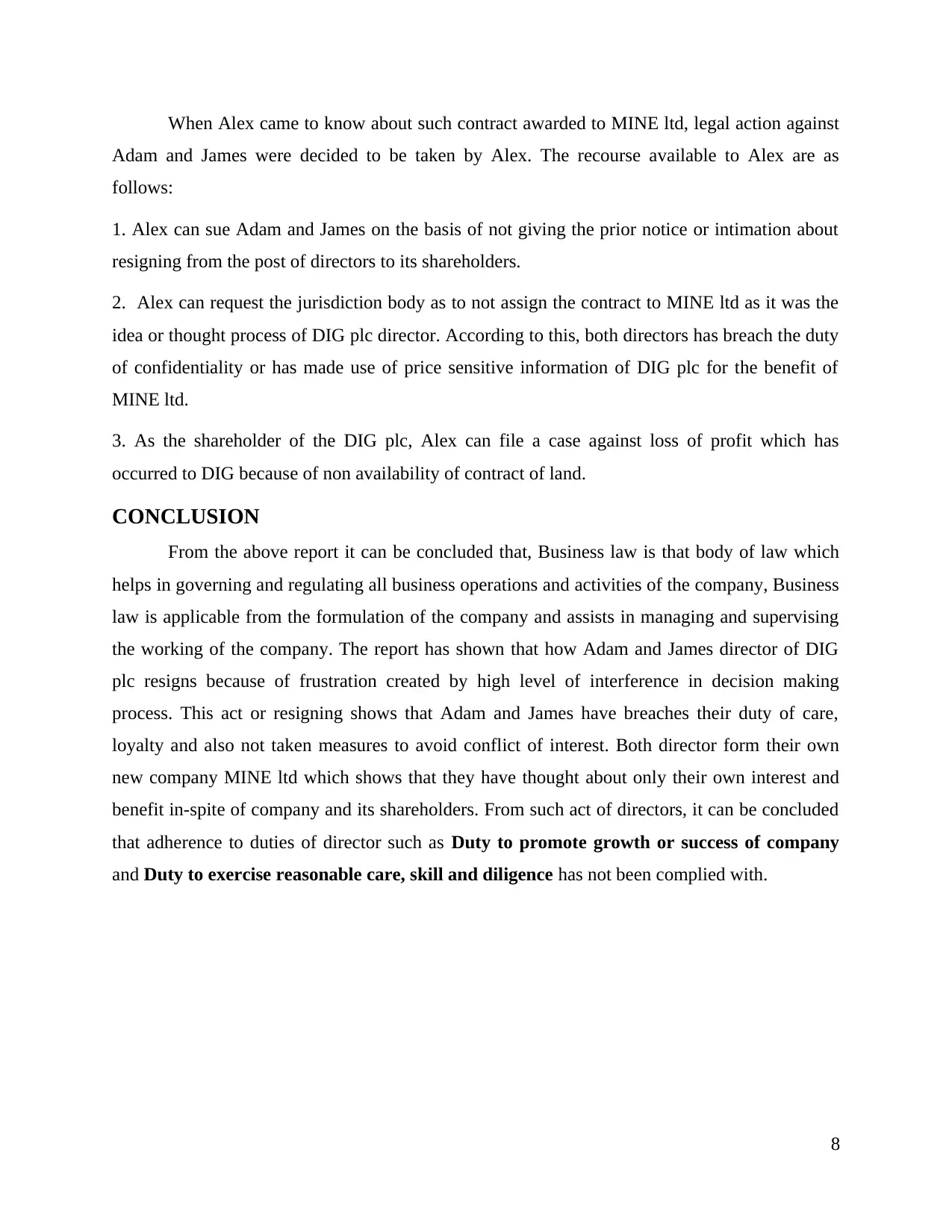
When Alex came to know about such contract awarded to MINE ltd, legal action against
Adam and James were decided to be taken by Alex. The recourse available to Alex are as
follows:
1. Alex can sue Adam and James on the basis of not giving the prior notice or intimation about
resigning from the post of directors to its shareholders.
2. Alex can request the jurisdiction body as to not assign the contract to MINE ltd as it was the
idea or thought process of DIG plc director. According to this, both directors has breach the duty
of confidentiality or has made use of price sensitive information of DIG plc for the benefit of
MINE ltd.
3. As the shareholder of the DIG plc, Alex can file a case against loss of profit which has
occurred to DIG because of non availability of contract of land.
CONCLUSION
From the above report it can be concluded that, Business law is that body of law which
helps in governing and regulating all business operations and activities of the company, Business
law is applicable from the formulation of the company and assists in managing and supervising
the working of the company. The report has shown that how Adam and James director of DIG
plc resigns because of frustration created by high level of interference in decision making
process. This act or resigning shows that Adam and James have breaches their duty of care,
loyalty and also not taken measures to avoid conflict of interest. Both director form their own
new company MINE ltd which shows that they have thought about only their own interest and
benefit in-spite of company and its shareholders. From such act of directors, it can be concluded
that adherence to duties of director such as Duty to promote growth or success of company
and Duty to exercise reasonable care, skill and diligence has not been complied with.
8
Adam and James were decided to be taken by Alex. The recourse available to Alex are as
follows:
1. Alex can sue Adam and James on the basis of not giving the prior notice or intimation about
resigning from the post of directors to its shareholders.
2. Alex can request the jurisdiction body as to not assign the contract to MINE ltd as it was the
idea or thought process of DIG plc director. According to this, both directors has breach the duty
of confidentiality or has made use of price sensitive information of DIG plc for the benefit of
MINE ltd.
3. As the shareholder of the DIG plc, Alex can file a case against loss of profit which has
occurred to DIG because of non availability of contract of land.
CONCLUSION
From the above report it can be concluded that, Business law is that body of law which
helps in governing and regulating all business operations and activities of the company, Business
law is applicable from the formulation of the company and assists in managing and supervising
the working of the company. The report has shown that how Adam and James director of DIG
plc resigns because of frustration created by high level of interference in decision making
process. This act or resigning shows that Adam and James have breaches their duty of care,
loyalty and also not taken measures to avoid conflict of interest. Both director form their own
new company MINE ltd which shows that they have thought about only their own interest and
benefit in-spite of company and its shareholders. From such act of directors, it can be concluded
that adherence to duties of director such as Duty to promote growth or success of company
and Duty to exercise reasonable care, skill and diligence has not been complied with.
8
Paraphrase This Document
Need a fresh take? Get an instant paraphrase of this document with our AI Paraphraser
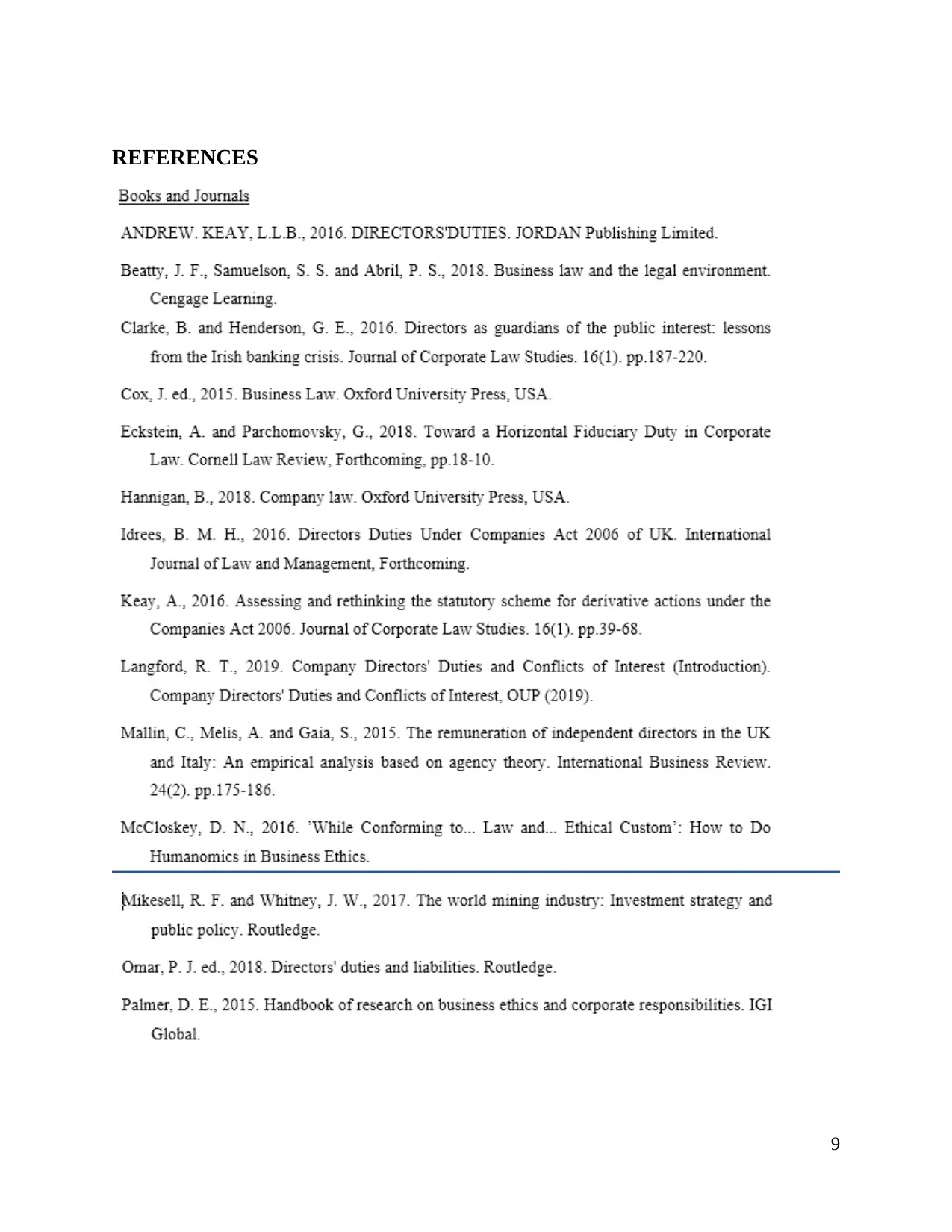
REFERENCES
9
9
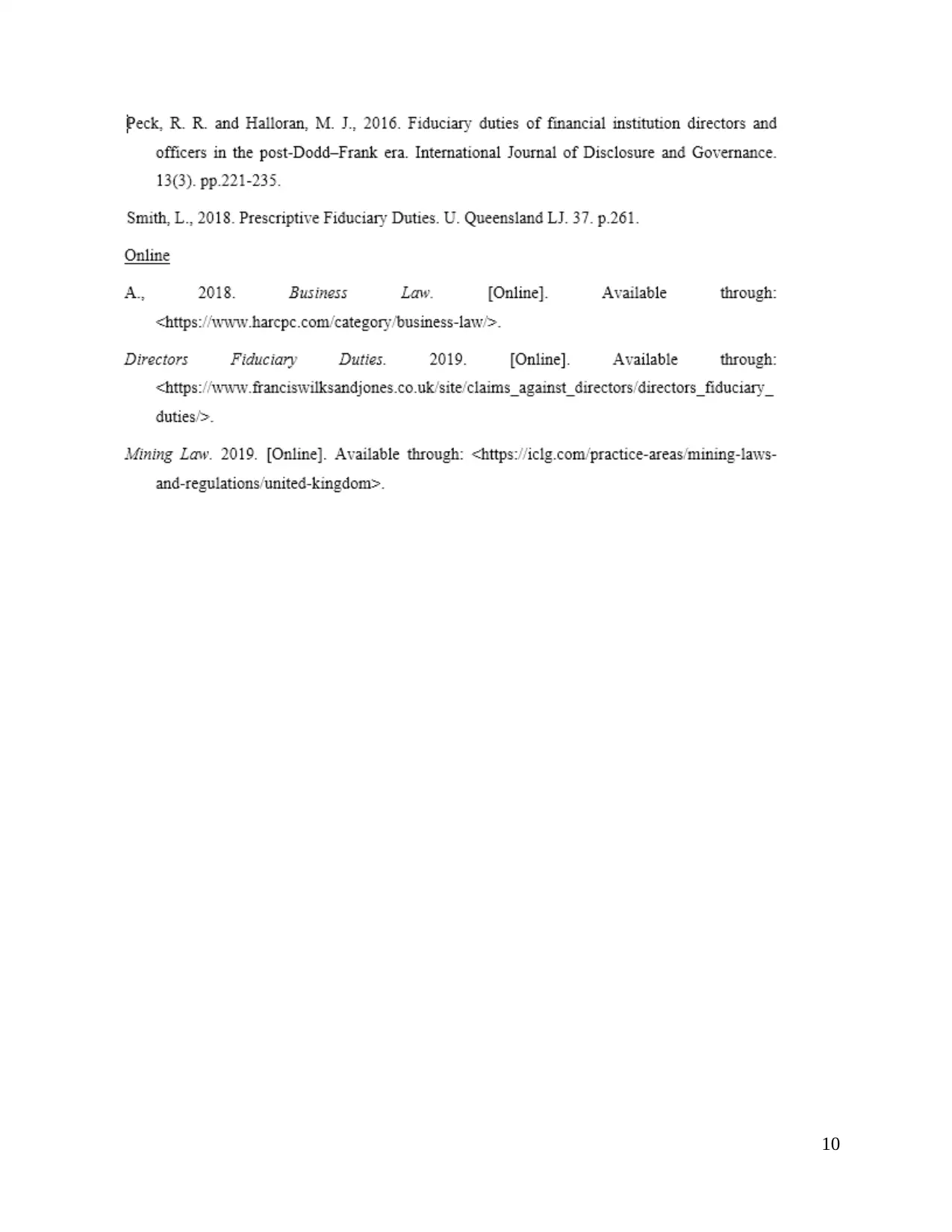
10
⊘ This is a preview!⊘
Do you want full access?
Subscribe today to unlock all pages.

Trusted by 1+ million students worldwide
1 out of 12
Your All-in-One AI-Powered Toolkit for Academic Success.
+13062052269
info@desklib.com
Available 24*7 on WhatsApp / Email
![[object Object]](/_next/static/media/star-bottom.7253800d.svg)
Unlock your academic potential
© 2024 | Zucol Services PVT LTD | All rights reserved.

